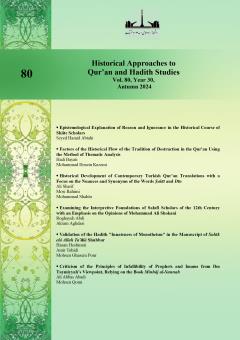Epistemological Explanation of Reason and Ignorance in the Historical Course of Shiite Scholars
Subject Areas :
1 - PhD in Quranic Sciences and Hadith, and Lecturer at Imam Hossein University (as), Tehran, Iran
Keywords: Reason and Ignorance, Historical Course, Epistemology, Shiite Scholars, Ḥadīth of Imam Ṣādiq (as).,
Abstract :
By studying the works and thoughts of Shiite scholars throughout history, we can see that the category of reason and ignorance has been explained and interpreted significantly from an epistemological perspective. The meaning of the epistemological explanation of reason and ignorance in the historical course of Shiite scholars is that based on the hadith of reason and ignorance from Imam Sadiq (as) which is mentioned in Shiite hadith collections, in which the knowledge of reason and ignorance is introduced as a tool for guiding humans, and this meaning cannot be realized except through the cognitive path. Shiite scholars have explained and enlightened this category with mystical and ethical approaches. Of course, the concept of reason and ignorance and numerous examples of it are also seen in the verses of the Holy Qur’an for the purpose of understanding and guiding humans, and this issue has been the focus and emphasis of Shiite scholars throughout time until the contemporary century. In this research, which has been written with an analytical, descriptive and critical method, some criticism and objections are also made to these ideas, especially in the quality of the creation of reason and ignorance. However, considering the course of thought of Shiite scholars throughout history, from the Kulayni to the Majlisi era and until the time of Imam Khomeini, it is possible to reach a set of epistemological and ethical ideas that reveal the intellectual path of the Ahl al-Bayt (as) by explaining and interpreting the hadiths in the explanations of the Shiite hadith scholars. This path can play a desirable guiding role in epistemological issues, especially reason and ignorance. That is why this issue has given a new originality to the present research, with an analytical and critical method.

